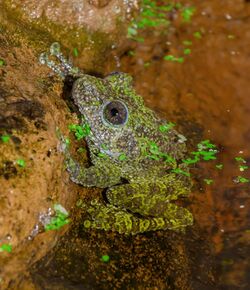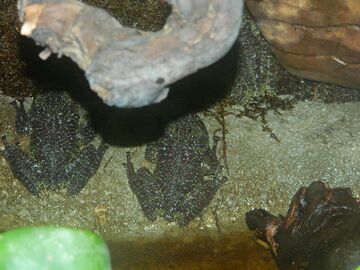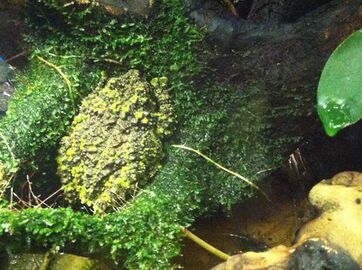Biology:Theloderma corticale
| Theloderma corticale | |
|---|---|

| |
| Scientific classification | |
| Kingdom: | Animalia |
| Phylum: | Chordata |
| Class: | Amphibia |
| Order: | Anura |
| Family: | Rhacophoridae |
| Genus: | Theloderma |
| Species: | T. corticale
|
| Binomial name | |
| Theloderma corticale (Boulenger, 1903)
| |
| Synonyms[2] | |
| |
Theloderma corticale (common names: mossy frog,[3] Vietnamese mossy frog,[4] Tonkin bug-eyed frog, moss bug-eyed frog,[2] and [for the formerly recognized Theloderma kwangsiense] Kwangsi warty treefrog) is a species of frog in the family Rhacophoridae. It is now known to be found in northern Vietnam, south–central Laos, and southern China (Guangdong, Guangxi, Hainan, Yunnan).[2][5]
Description
The common name "mossy frog" arises from the fact that its skin is a mottled green and brown that resembles moss growing on rock, and forms an effective form of camouflage. They have large sticky pads on their toes and a soft underbelly. They measure about 61 mm (2.4 in) in snout–vent length.[6] The females will grow larger than the males and can reach sizes of 8–9 cm (3.1–3.5 in). This species will curl into a ball when frightened, and play dead.[3][4]
-
Three individuals camouflaged on a rock face
-
An individual camouflaged on a mossy surface
Habitat
Its natural habitats are primarily evergreen rainforests and subtropical forest where they have been found inside pools in hollowed-out logs, placed by the local villagers. It is semi-aquatic and found in caves and steep rocky cliffs. This frog has been observed between 470 and 1500 meters above sea level. Breeding takes place in rock cavities or tree holes.[1][3][4][2]
Diet
Its diet consists of crickets, cockroaches, and earthworms.
Conservation
Its habitat is threatened by forest loss. It is also collected for the international pet trade. Like many amphibians, the Vietnamese mossy frog is vulnerable to the chytrid fungus Batrachochytrium dendrobatidis. Nonetheless, the conservation of this species is classified as "Least Concern" by the International Union for Conservation of Nature.[1]
References
- ↑ 1.0 1.1 1.2 IUCN SSC Amphibian Specialist Group (2017). "Theloderma corticale". IUCN Red List of Threatened Species 2017. doi:10.2305/IUCN.UK.2017-2.RLTS.T59033A87476136.en. https://www.iucnredlist.org/species/59033/87476136. Retrieved 15 November 2021.
- ↑ 2.0 2.1 2.2 2.3 Frost, Darrel R. (2022). "Theloderma corticale (Boulenger, 1903)". Amphibian Species of the World: An Online Reference. Version 6.1. American Museum of Natural History. doi:10.5531/db.vz.0001. https://amphibiansoftheworld.amnh.org/Amphibia/Anura/Rhacophoridae/Rhacophorinae/Theloderma/Theloderma-corticale.
- ↑ 3.0 3.1 3.2 "Mossy Frog (Theloderma corticale)". World Association of Zoos and Aquariums. http://www.waza.org/en/zoo/pick-a-picture/theloderma-corticale.
- ↑ 4.0 4.1 4.2 "Vietnamese Mossy Frog (Theloderma corticale)". Newquay Zoo. http://www.newquayzoo.org.uk/animals-plants/animals/details/mossy-frog.
- ↑ Huang, Huayuan; Chen, Zening; Wei, Zhonghui; Bu, Rongping; Wu, Zhengjun (2018-02-17). "DNA barcoding revises a misidentification on mossy frog: new record and distribution extension of Theloderma corticale Boulenger, 1903 (Amphibia: Anura: Rhacophoridae)" (in en). Mitochondrial DNA Part A 29 (2): 273–280. doi:10.1080/24701394.2016.1275601. ISSN 2470-1394. https://www.tandfonline.com/doi/full/10.1080/24701394.2016.1275601.
- ↑ Fei, L. (1999) (in Chinese). Atlas of Amphibians of China. Zhengzhou: Henan Press of Science and Technology. p. 266. ISBN 7-5349-1835-9.
External links
 Data related to Theloderma corticale at Wikispecies
Data related to Theloderma corticale at Wikispecies
Wikidata ☰ {{{from}}} entry
 |



